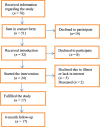An app for supporting older people receiving home care - usage, aspects of health and health literacy: a quasi-experimental study
- PMID: 32933500
- PMCID: PMC7493150
- DOI: 10.1186/s12911-020-01246-3
An app for supporting older people receiving home care - usage, aspects of health and health literacy: a quasi-experimental study
Abstract
Background: During the last decade, there has been an increase in studies describing use of mHealth, using smartphones with apps, in the healthcare system by a variety of populations. Despite this, few interventions including apps are targeting older people receiving home care. Developing mobile technology to its full potential of being interactive in real time remains a challenge. The current study is part of a larger project for identifying and managing health concerns via an app by using real-time data. The aim of the study was to describe older people's usage of an app and to evaluate the impact of usage on aspects of health and health literacy over time.
Methods: A quasi-experimental design was employed. Seventeen older people self-reported health concerns via Interaktor twice a week for 3-months and answered questionnaires at baseline, the end of the intervention and at a 6-month follow-up. Logged data on app usage and data on Sense of Coherence, Health Index, Nutrition Form for the Elderly, Geriatric Depression Scale-20, Swedish Communicative and Critical Health Literacy and Swedish Functional Health Literacy were collected and analysed using descriptive and non-parametric inferential statistics.
Results: The median usage of the app as intended was 96%. Pain was one of the most reported health concerns and was also the health concern that triggered an alert (n = 33). The older people's communicative and critical health literacy improved significantly over time. Regarding the scores of Sense of Coherence, Health Index, Nutritional Form for the Elderly, Geriatric Depression Scale-20 and Swedish Functional Health Literacy scale, there were no significant differences over time.
Conclusions: The high app usage showed that an app may be a suitable tool for some older people living alone and receiving home care. The results indicate that the usage of Interaktor can support older people by significantly improving their communicative and critical health literacy. Aspects of health were not shown to be affected by the usage of the app. Further research with larger sample is needed for evaluation the effect on health literacy, and which aspects of health of importance to support by an app.
Keywords: Alert; App; Health; Health concerns; Home care; Older people; Self-report; Usage; mHealth.
Conflict of interest statement
The authors declare that they have no competing interests.
Figures
Similar articles
-
Testing an app for reporting health concerns-Experiences from older people and home care nurses.Int J Older People Nurs. 2018 Jun;13(2):e12181. doi: 10.1111/opn.12181. Epub 2017 Dec 5. Int J Older People Nurs. 2018. PMID: 29210218
-
Self-care ability and sense of security among older persons when using an app as a tool for support.Scand J Caring Sci. 2020 Sep;34(3):772-781. doi: 10.1111/scs.12782. Epub 2019 Nov 26. Scand J Caring Sci. 2020. PMID: 31769888
-
Mobile Health Usage, Preferences, Barriers, and eHealth Literacy in Rheumatology: Patient Survey Study.JMIR Mhealth Uhealth. 2020 Aug 12;8(8):e19661. doi: 10.2196/19661. JMIR Mhealth Uhealth. 2020. PMID: 32678796 Free PMC article.
-
Using Smartphones and Health Apps to Change and Manage Health Behaviors: A Population-Based Survey.J Med Internet Res. 2017 Apr 5;19(4):e101. doi: 10.2196/jmir.6838. J Med Internet Res. 2017. PMID: 28381394 Free PMC article.
-
Evaluation of Self-Management Support Functions in Apps for People With Persistent Pain: Systematic Review.JMIR Mhealth Uhealth. 2019 Feb 12;7(2):e13080. doi: 10.2196/13080. JMIR Mhealth Uhealth. 2019. PMID: 30747715 Free PMC article.
Cited by
-
Factors Influencing Adherence to mHealth Apps for Prevention or Management of Noncommunicable Diseases: Systematic Review.J Med Internet Res. 2022 May 25;24(5):e35371. doi: 10.2196/35371. J Med Internet Res. 2022. PMID: 35612886 Free PMC article.
-
Suffering and Salutogenesis: A Conceptual Analysis of Lessons for Psychiatry From Existential Positive Psychology (PP2.0) in the Setting of the COVID-19 Pandemic.Front Psychol. 2021 Apr 9;12:646334. doi: 10.3389/fpsyg.2021.646334. eCollection 2021. Front Psychol. 2021. PMID: 33897551 Free PMC article. Review.
-
Using a Mobile Application for Health Communication to Facilitate a Sense of Coherence: Experiences of Older Persons with Cognitive Impairment.Int J Environ Res Public Health. 2021 Oct 28;18(21):11332. doi: 10.3390/ijerph182111332. Int J Environ Res Public Health. 2021. PMID: 34769845 Free PMC article.
-
Difficulty and help with activities of daily living among older adults living alone during the COVID-19 pandemic: a multi-country population-based study.BMC Geriatr. 2022 Mar 4;22(1):181. doi: 10.1186/s12877-022-02799-w. BMC Geriatr. 2022. PMID: 35246064 Free PMC article.
-
Digital home care interventions and quality of primary care for older adults: a scoping review.BMC Geriatr. 2024 Jun 10;24(1):507. doi: 10.1186/s12877-024-05120-z. BMC Geriatr. 2024. PMID: 38858634 Free PMC article.
References
-
- Vroman KG, Arthanat S, Lysack C. “Who over 65 is online?” Older adults’ dispositions toward information communication technology. Comput Human Behav. 2015;43:156–166. doi: 10.1016/j.chb.2014.10.018. - DOI
-
- Zhang Y, Lauche R, Sibbritt D, Olaniran B, Cook R, Adams J. Comparison of health information technology use between american adults with and without chronic health conditions: findings from the national health interview survey 2012. J Med Internet Res. 2017;19(10):e335. doi: 10.2196/jmir.6989. - DOI - PMC - PubMed
-
- World Health Organization. Health literacy The mandate for health literacy: World Health Organisation; 2016. Available from: https://www.who.int/healthpromotion/conferences/9gchp/health-literacy/en/. Accessed 12 Dec 2018.
Publication types
MeSH terms
Grants and funding
LinkOut - more resources
Full Text Sources
Medical


